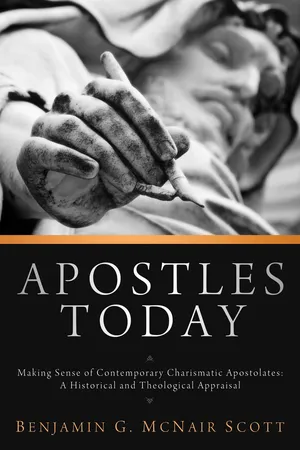![]()
Part One
Where We Are
![]()
1
Apostles Today
USA
Introduction
How widespread is the idea of the charismatic apostolate? What is being said about it across the churches? This and the next chapter attempt to provide an overview of what is happening and what is being advocated amongst churches in America and Britain. It is important to recognize that this whole phenomenon does not occur within a vacuum, there are well established traditions that already exist within churches which this concept comes into contact with. Therefore, we need to briefly highlight some of those traditions that have bearing upon any talk of an ongoing charismatic apostolate and which are prevalent amongst churches that have a substantial history and a large membership—the Roman Catholic Church; the Orthodox Church; the Anglican Church; the Presbyterian Church; the Lutheran Church; the Baptist Church; the Methodist Church. It is important to note that none of these churches have an official doctrine on the charismatic apostolate; however, they all have advocated certain forms of ministry which they connect to apostolicity. Inevitably, all of these churches will have had prominent figures within them who have not agreed with their official line on certain aspects of theology or ecclesiology; furthermore, although their own historic formularies and norms still have a profound impact upon the fashioning of ministries within these churches, the ecumenical climate of the twentieth century has softened some edges to former intransient perspectives.
The Roman Catholic, Orthodox, and Anglican churches hold that the bishop is the historic successor of the apostles, being the sole ministry able to ordain others, and possessing an apostolic sacramental ministry which they share with their co-workers the priests.1 Lutherans and Methodists hold to a form of apostolic succession but believe it can be validly passed on via the presbyterate. These churches clearly differentiate between those first apostles who were eyewitnesses of the resurrected Lord, instructed directly by Jesus, receiving revelation that was to be part of the deposit of faith entrusted to all the saints, and their successors. Although they are seen as the successors of the apostles they have not tended to be called “apostles” themselves, but it is not unheard of; according to J. D. Bales, in the first couple of centuries of the church, there was a practice of referring to those who were ordained by the apostles as apostles themselves.2 Nevertheless, it is not a tradition that had much support, as is evident from early church sources (see chap. 4) and is not one that has been retained in the oldest churches. Even so, acceptable traditions have developed of posthumously naming certain pioneering/missionary leaders as apostles so “Dionysius of Corinth was called the Apostle of France; Xavier was called the Apostle of the Indies.”3 Within the Orthodox Church it is a common practice to recognize such figures as “equal to the apostles,” a term that in some Orthodox circles is even today applied to missionaries.
More recently a trend has occurred amongst Christians of a more catholic persuasion, popularized by Vatican II, which speaks of all Christians (ordained and lay) as apostles, in that all Christians are sent to bear witness to Christ in the world.4 The Anglican bishop Stephen Cottrell follows in this tradition and justifies the use of this term as it highlights that “they have a share in the apostolic vocation of the church.”5 This use does not make any claims regarding the spiritual authority of Christians and merely highlights their common vocation; nevertheless, it is an important developing tradition as it reflects a wider fashion to use the language of “apostle.” Even though these traditions are present, apostolic succession churches tend to be wary of talk about charismatic apostolic ministry apart from historical succession.
There has been an overt rejection of the idea that there is a continuation of the apostolic office in any form amongst non-historical succession, non-Pentecostal Protestant churches. For example, the Westminster Standard states, “The officers which Christ hath appointed for the edification of his church, and the perfecting of the saints, are, some extraordinary, as apostles, evangelists, and prophets, which are ceased.”6 Although this is the mainstream view within the Baptist Church, it is important to note that they did have an office of “Messenger,” which was modeled on New Testament trans-local apostolic ministry. Despite abandoning this development the Baptist Church has been very involved in sending people out as missionaries, as have other cessationist, anti-apostolic succession Protestant churches. Nevertheless, these churches and Apostolic Succession churches have been affected by the Pentecostal Charismatic Movement and felt the challenge of the emphasis on Charismatic gifts and ministries.
Pentecostal/Charismatic Churches and “Apostleship” Today
In the last couple of decades within Charismatic circles there have been many “prophetic” promises concerning the restoration of a charismatic apostolate: “God will bring forth the full stature of the Apostle”7 (K. Hagin). “Some time ago, God spoke to me very clearly that He was shortly going to manifest apostles . . . in the body of Christ.”8 These particular predictions appear to be coming to pass if we are to believe that the number of Christian ministers who are claiming to embody or have this “anointing”/“office”/“ministry”/“gift”9 are justified in so doing. There has been a wealth of popular books and articles written by denominational and non-denominational Charismatics advocating the charismatic apostolate.10 This is not a new belief,11 but, there is evi...
